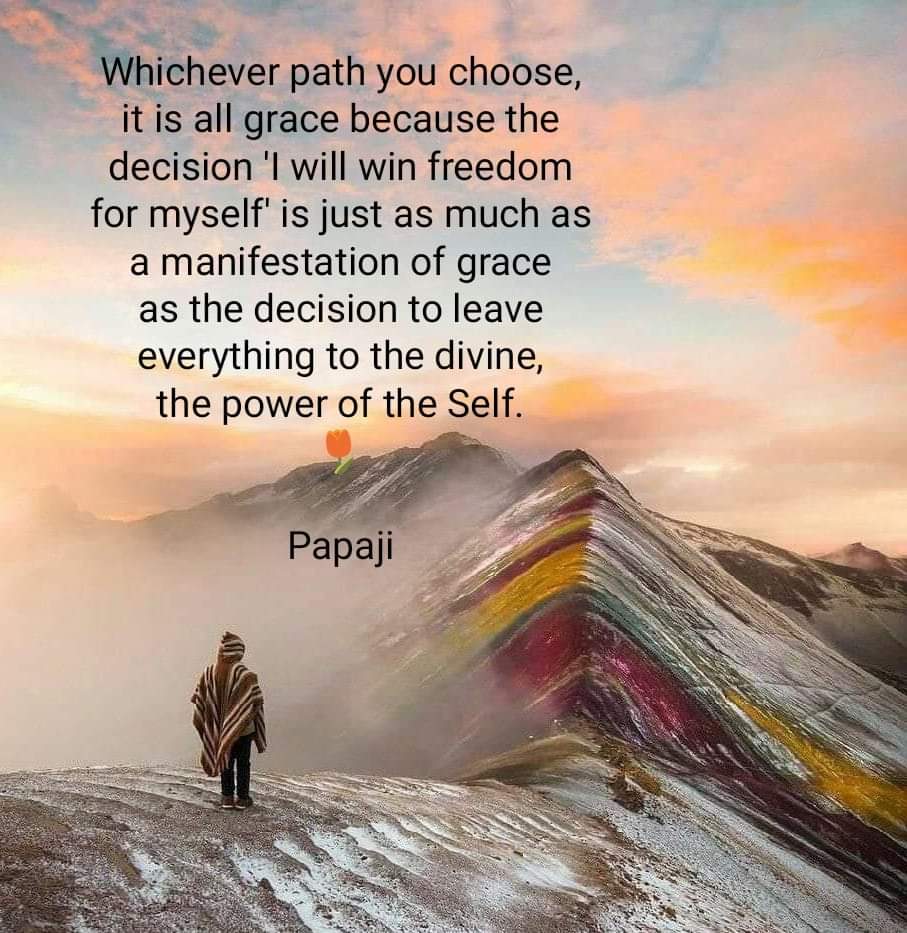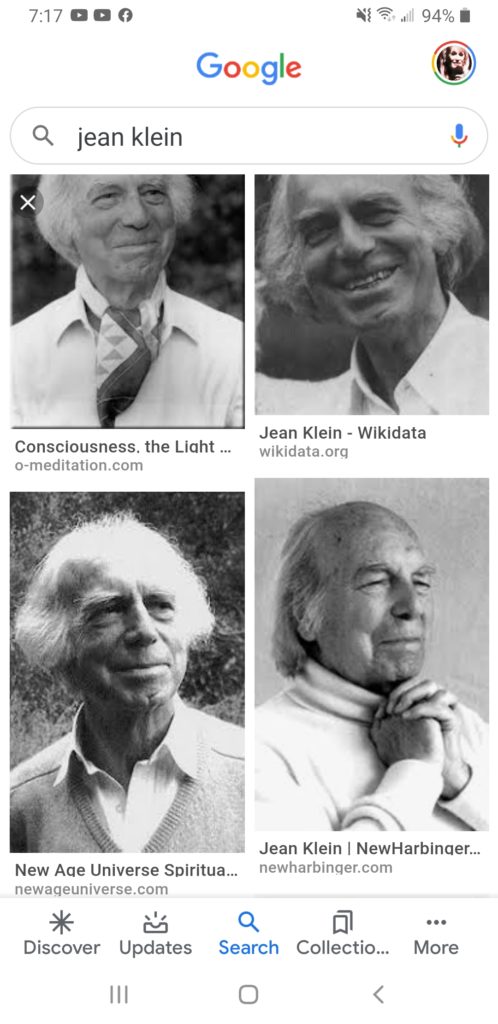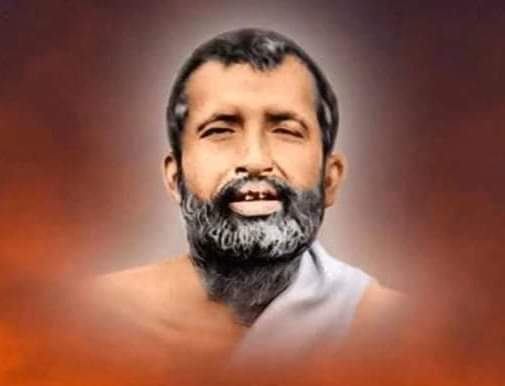“The whole world yearns after freedom, yet each creature is in love with his chains; this is the first paradox and inextricable knot of our nature.”
~ Sri Aurobindo (19th-20th century Indian Advaita mystic)
“The whole world yearns after freedom, yet each creature is in love with his chains; this is the first paradox and inextricable knot of our nature.”
~ Sri Aurobindo (19th-20th century Indian Advaita mystic)
“You are pure Consciousness—the substance of the universe. The universe exists within you. Don’t be small-minded. You are unconditioned, changeless, formless. You are solid, unfathomable, cool. Desire nothing. You are Consciousness.”
~ Ashtavakra Gita (Advaita Vedanta scripture)
Even when the grace comes from
what is apparently an ‘outside’ source,
the form of the Guru, it is still only
pointing to the Self within, the
power that will take you
into the Self.
Papaji

आनन्दाभ्यासयोगाद्विकृतजगदानन्दजगतो
अतो हेतोर्धर्मो न भवति शिवः कारणपरः।
हिरण्यात्माssदित्येsक्षिणि उदेतीह भगवान्
नतेश्चाधाराणां श्रवणवचनैर्गोपितधियः।।
To the one who can ‘see’, even the trivial
worldly happiness appears as the joy of
Brahman. For such there is no prop and
standard other than Siva and Self, the
cause of the lofty and the petty alike.
The sun, the illuminator and energizer
of the worlds, appears dawning beyond
the yonder horizon, when in reality it
is in the eye [the figurative I]
of the Knower.
Attention to the spiritual aspirants:
Resist the temptation of re coursing
to loud, exhibitory and ‘clever’ exercises
to reach the all-impregnating Almighty
who is verily the embodiment of peace,
simplicity, unostentatious love and
sweet quiescence. Worship him with
noiseless prayer, quiet joy, guileless
affection, supreme peace and total
self-effacement and you shall
see Him losing to you
in all fullness.
The Ribhu Gita
[Shri Siva Rahasyam]

Jean Klein was a French author, spiritual teacher and philosopher of Advaita Vedanta. According to Jean Klein, it is only in a “spontaneous state of interior silence that we can open ourselves to our true nature: the ‘I Am’ of pure consciousness.” Wikipedia

To meditate, you should withdraw
within yourself or retire to a secluded
corner or to the forest. And you should
always discriminate between the Real
and the unreal. God alone is Real, the
Eternal Substance; all else is unreal,
that is, impermanent.
By discriminating thus, one should
shake off impermanent objects
from the mind.
Shri Ramakrishna Paramahansa

You have just forgotten yourself.
Nothing is lost, nothing is missing, nothing has to be found. Just remember. A simple remembering – the simplest things are very difficult, that’s true – and this is the most simple thing.
None of the problems are yours. As far as you are concerned, no problem can enter in you, but you can get identified with something which is not you.
I remember a story. A man’s house caught fire. The house was on fire, and it had taken the man’s whole life’s effort to make that beautiful place. Thousands of people had gathered, but there was nothing that could be done. The fire had become so big. And you can understand that man: tears were coming from his eyes. It was his whole life burning in front of him. And then suddenly his son came running and he said, ”Dad, why are you worried? We sold the house yesterday. You were out… but we have sold the house. It is now for somebody else to cry and weep, not for you. And we have got enough profit out of it.”
The man immediately wiped away his tears and became just a spectator like the others were spectators. The identity, the invisible identity, ”It is my house,” was no longer there. There was no pain, there was no misery, there was no problem at all. And he was really happy in a way: ”Now we can make a better house.” He was feeling relieved; the house was burning, and he was feeling relieved.
And then a second son came running. He said, ”It is true that we had negotiated the sale, but the papers were not signed and the money has not been transferred. So it is our house that is burning, and you are looking at it as if you are just a spectator!” Again those tears were flowing and again the heart was breaking. And nothing has visibly changed: the house is burning, the man is standing there. But these people who are bringing messages are changing everything! When he becomes identified, he is burning with the house. When he gets unidentified, he is relieved and he has nothing to do with the house; it is somebody else’s house.
To be a beggar I only mean that although you live in palaces, but don’t let palaces live in you. Ownership is illusion, as permanence is illusion. Except the Eternal all is accidental. Except the Eternal all is misery, all is a bondage.
AND WHAT IS IT YOU GUARD WITH FASTENED DOORS?
DROPPING THE IDEA OF OWNERSHIP IS RENUNCIATION. RENUNCIATION IS NOT DROPPING THE POSSESSIONS BUT POSSESSIVENESS. Look at your possessions. Do you possess them?. If your house is destroyed you will weep, you will scream, you will go mad, but if you die, your house is not going to weep, it is not going to go mad. So who was the real owner?. The house owns you. It doesn’t care a bit about you: whether you live in it or not. This sutra is meaningful in this sense that only the self can be possessed and nothing else. And if you cannot possess your self, what else do you think you can possess?”.
“So be a master – the master of your own self – and don’t make any effort to possess anything. I don’t mean to leave everything. That’s not the point. Use everything, but don’t think in terms of possessing. Use the house, but don’t be the owner. Use wealth; don’t be the owner of it. Use the whole world, but don’t think that you possess it. You are just a traveller. You come to a point where the things you wanted are there, whatever you desired has happened, but you have become the slave. The kingdom now appears to be nothing but an imprisonment and whatever you possess, or think that you possess, is not really possessed, because it can be taken away at any moment. Even if no one takes it away, death is bound to take it. In religious terminology, that which can be taken away by death is not yours. Death is the criterion. There is only one criterion to judge whether you really possess something. Judge it against death and see whether you will still have it after your death. If death takes it, you never possessed it. It was just an illusion. Ownership is illusion, because permanence is illusion. But there is something that death cannot take over and that something is hidden within you. You already possess it. It is your innermost nature. It has come with you; you are born with it. Or rather, it will be better to say that you are it, not that you possess it. If you possess it, it can be taken away. You are it, it is your very being. It is your very ground; it is your existence. That is what is called atman, Soul, Consciousness. Atman means that which you are already. No one can take it away from you; not even death can destroy it”.
Osho- The Path of the Mystic
“Do not stir the mind with ‘yes’ or ‘no.’ You are pure Consciousness. Be still, and abide in the bliss of Self. Give up completely all contemplation. Hold nothing in the mind or heart. You are the Self, forever free. Of what use is thinking to you?”
~ Ashtavakra Gita (Advaita Vedanta scripture)
Papaji
Keep quiet. Don’t touch the thoughts. Let them be.
Those of us who learn step by step from our reading, listening and experiencing don’t need to be deprived of the clearing-the-mind-entirely (TM) type of meditation and all the benefits it affords.
Nor do those who sit erect in lotus position need to deprive themselves of the discipline of an astute rigorous pondering of well-researched spiritual topics.
These two disciplines are really quite compatible – like kissing cousins!
DrRobinStarbuck 2018
••••••••••••••••••••••••••••••••••••••••••••••••••••••••••••••••••••••••••
YOU WANT DOMINION AND POWER OVER ILLUSION AND HYPNOTISM ? FOCUS ON THE ABSOLUTE .
▪︎▪︎▪︎▪︎▪︎▪︎▪︎▪︎▪︎▪︎▪︎▪︎▪︎▪︎▪︎▪︎▪︎▪︎▪︎
“When you remain in the silence and you do not talk much then the appearance of this world begins to dissolve. The appearance of the body begins to dissolve. You begin to feel differently. You begin to see things differently. You are no longer surviving, trying to make ends meet, trying to improve your condition. You begin to understand there is no condition to improve. You are beyond conditioning. Good or bad. Sickness or health. Lack or limitation or riches. It’s all the same. It’s neither good nor bad. It’s an appearance. And whatever you’re experiencing, you have to experience the other.
It’s like a pendulum swinging back and forth. The pendulum goes to one side then has to go back to the other side. And so it is with human life. So-called human life is the same thing. We experience one side of it then we experience the other side of it sooner or later. But no human being, so-to-speak, ever experiences oneness—it’s impossible. For the whole universe is duality. So, many people when they first get involved with Advaita Vedanta or Jnana believe that it’s a very selfish teaching, believe that it’s a very conceited teaching.
Why? For the idea is to become self-realized. Jnani’s are always expressing themselves, ‘I am Brahman. I am pure awareness, I am the absolute reality,’ and people who do not understand this say, ‘why don’t you think about this world? Why don’t you help the poor? Why don’t you help alleviate man’s inhumanity to man?’ … They say this because they do not understand what we’re talking about.
When a being becomes so-called self-realized the self-realization is not for him or her alone. The self-realization is a universal feeling. I am the universe is a realization. I am the Brahman, the all-pervading one, this is a realization. The realization is not about yourself. This is something we always have to remember. It is not selfishness. This teaching is not conceit. For when you become self-realized there is no longer a you. What you have called a you has disappeared. What you call you has become the whole universe.
Therefore just by being self-realized you are helping the world without thinking about it. Again why? Because you have become the world, you see? You’re no longer Jack or Jane or Mary or Bob or anybody else. A person who touches their self-realization becomes the entire universe. And therefore you see only the goodness. You do not separate goodness from badness, there is no longer any badness in your psyche, in your consciousness you have transcended [so-called] badness.
Everything is good, even the so-called evil, the things we call evil on this earthly plane. You begin to understand that everything that happens to you is for your own good, for your own benefit. Nothing is here to ever hurt you, as strange as it may seem. Everything is here for your [spiritual] advancement, everything. Every situation, every predicament is there for your advancement. Consequently this teaching is the most unselfish teaching there is. For when a Jnani says, ‘I am Brahman,’ he’s not referring to his humanhood.”
~ Robert Adams (20th century American Advaita mystic)